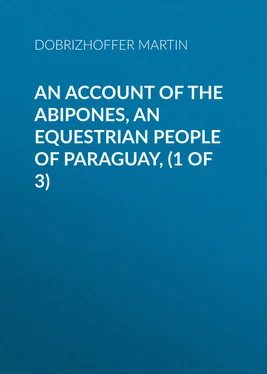Martin Dobrizhoffer - An Account of the Abipones, an Equestrian People of Paraguay, (1 of 3)
Здесь есть возможность читать онлайн «Martin Dobrizhoffer - An Account of the Abipones, an Equestrian People of Paraguay, (1 of 3)» — ознакомительный отрывок электронной книги совершенно бесплатно, а после прочтения отрывка купить полную версию. В некоторых случаях можно слушать аудио, скачать через торрент в формате fb2 и присутствует краткое содержание. Жанр: foreign_antique, foreign_prose, на английском языке. Описание произведения, (предисловие) а так же отзывы посетителей доступны на портале библиотеки ЛибКат.
- Название:An Account of the Abipones, an Equestrian People of Paraguay, (1 of 3)
- Автор:
- Жанр:
- Год:неизвестен
- ISBN:нет данных
- Рейтинг книги:3 / 5. Голосов: 1
-
Избранное:Добавить в избранное
- Отзывы:
-
Ваша оценка:
- 60
- 1
- 2
- 3
- 4
- 5
An Account of the Abipones, an Equestrian People of Paraguay, (1 of 3): краткое содержание, описание и аннотация
Предлагаем к чтению аннотацию, описание, краткое содержание или предисловие (зависит от того, что написал сам автор книги «An Account of the Abipones, an Equestrian People of Paraguay, (1 of 3)»). Если вы не нашли необходимую информацию о книге — напишите в комментариях, мы постараемся отыскать её.
An Account of the Abipones, an Equestrian People of Paraguay, (1 of 3) — читать онлайн ознакомительный отрывок
Ниже представлен текст книги, разбитый по страницам. Система сохранения места последней прочитанной страницы, позволяет с удобством читать онлайн бесплатно книгу «An Account of the Abipones, an Equestrian People of Paraguay, (1 of 3)», без необходимости каждый раз заново искать на чём Вы остановились. Поставьте закладку, и сможете в любой момент перейти на страницу, на которой закончили чтение.
Интервал:
Закладка:
In the districts of Rioja and Catamarca there is very scanty pasturage, and consequently few cattle; a want compensated by the fertility of the soil, the productiveness of the trees, and the industry of the inhabitants, who dry figs, weave a kind of woollen garment in common use, dress ox and sheep hides to great perfection, and apply the leather to various purposes, as saddles, trunks, and similar articles, to be commuted for other goods. Xuxuy, a district of St. Salvador, situate on the Peruvian side of Tucuman, though far from populous, is the seat of the royal treasurers for the last mentioned country. In this place, the tertian ague and wens are common; a circumstance arising from the rivulets flowing from the neighbouring mountains. Talavera de Madrid, also called Esteco, a state formerly flourishing in vices as in wealth, situate on the bank of the river Salado, is said to have been swallowed up, in the last century, with all its houses and inhabitants, by a violent earthquake; the ill-fated pillar applied to the punishment of delinquents alone remaining in the market-place.
Fareja, a city of some note, though within the jurisdiction of Chichas in Peru, contains Jesuits from Paraguay, who, in the hopes of civilizing the Chiriguanàs, a barbarous race, always hostile to the Spaniards, have neither spared their labour nor their lives; five of them were butchered by these savages.
Santa Cruz de la Sierra, with its territory, though bordering on the eastern confines of Peru, is within the dominions of Paraguay. Its longitude is 314°, its latitude 21°. It has its own governour and bishop, to whom are subject the towns of the Chiquitos, savages for many years instructed by the Jesuits in religion, humanity, and the useful arts, amid their distant woods. In 1766, the ten towns of the Chiquitos, founded by men of our order, contained 5173 families, and 23,788 souls; but the number of deaths far exceeds that of births. Whether this paucity of issue is to be attributed to the climate, the water, their food – especially the land-tortoises they use so much – or to a natural sterility in the parents, let the learned judge. I have frequently heard, that had not the Jesuits yearly brought a multitude of savages from the woods, the towns must long since have been depopulated.
In each of the cities of Tucuman and Paraguay, the followers of St. Dominic, St. Francis, and St. Pedro de Nolasco, as well as the Jesuits, have their own establishment. Nuns of various orders dwell in Cordoba and Buenos-Ayres, but no where else. The Spaniards account Tucuman the poorest country in America, because it is destitute of gold, notwithstanding its numerous herds of cattle of every description. This province has been honoured with the presence of St. Francis Solano. When he was called away to Paraguay, many whole states were left without a single priest. Francis Victoria, of the order of St. Dominic, first bishop of Tucuman, in 1581 found only five secular priests and a few religious, with not one presbyter who understood the language of the natives, though the province abounded in Indian colonies. Solicitous for the glory of God, this bishop wrote to request Father Juan Atienza in Peru, and Joseph Anchuela in Brazil, to send him a few Jesuits already tried by previous exertions in the Christian cause. Fathers Leonardo Arminio, an Italian; Juan Saloni, a Spaniard; Thomas Fields, an Irishman; Manuel Ortega, and Estevam de Grao, Portugueze, were sent by sea from Brazil, and being taken by the English, were for some time infamously treated, and at last exposed to the winds and waves in an open boat; but Providence happily guiding them, reached the port of Buenos-Ayres. From Peru, Fathers Francis Angulo and Alphonso Barzena had been already despatched into Tucuman. The last of these was created vicar-general by Victoria, who esteemed him so highly as openly to declare that he would himself vacate the bishopric could Barzena benefit by his abdication. To these have succeeded men of our order, one after another, for nearly two centuries. Summoned by the bishop and royal governour, sent from Europe by their Catholic sovereigns, and dispersed in every corner of Paraguay's immense extent, how strenuously they have toiled for God and their King, it is not my business to relate. Thousands of savages won over to God and the King, colonies founded on every side, churches built to the Lord, and numbers of Spanish cities imbued with learning and piety – these will testify that we have at least done something for the Antipodes, though many have left no stone unturned to blot out our very name. This is, however, beyond dispute; – that a far more abundant harvest might have been reaped from our apostolic labours, if the Europeans had not uniformly opposed every measure conducive to the advantage of the Indians. Not a savage would now have been left in America, had every professor of Christianity conformed his life to its dictates, and joined his endeavours vigorously to ours.
The third division, from which the whole province takes its name, is that of Paraguay, so called from the river on which it borders. In regard to the laws of dominion its extent is immense; but from the dangerous vicinity of the savages on one hand, and the Portugueze on the other, the inhabitants, considering their number, are contracted into somewhat narrow limits. Extensive and fertile plains, both to the west on the opposite side of the river, and towards the north, are totally neglected, on two accounts – their distance from the metropolis, and the above-mentioned neighbours. The Corrientine country is accounted the southern boundary. The inhabitants are almost incalculably numerous. There are who assert their capability of bringing ten thousand soldiers into the field, Spaniards only: for if you count Indian natives, and all the herd of negroes, and other slaves, you might reckon up three times that number. But the majority of these deserve the motto – " Nos numerus sumus, et fruges consumere nati. " Some one was heard to complain of the governours of Paraguay – that many soldiers were ranged under the banners, but few who were furnished with a musket, and still fewer who could manage one if they had it. The metropolis, Asumpcion, takes its name from the assumption of the Virgin Mary. It is situated in latitude 25° 8´ and longitude 319° 41´, on the banks of the Paraguay, which affords a convenient station for ships and an opportunity of commerce, but menaces destruction to the city; for the channel constantly nearing and nearing, undermines the bank and the houses situate thereupon. Neither splendid edifices nor city fortifications are here to be found. Many of the houses are of stone or brick, and roofed with tiles, but none of them are above one story high. The monasteries are nearly of the same description, possessing nothing by which you could recognise the church. The streets are crooked, and impeded with ditches and stones thrown out of their places, to the imminent peril both of men and horses. It has but one market-place, and that covered with grass. The governor and bishop have resided here since the time of Charles V. though neither has any proper seat. Besides grammar, the scholars in our college pay much attention to philosophy and theology. For the negroes, Indians, and mulattos, there is a separate priest and parish church. Even matrons of the higher rank, boys, girls, and all the lower orders speak Guarany, though the generality have some acquaintance with Spanish. To say the truth, they mingle both, and speak neither correctly. When the Spaniards first occupied this province, in which the Guaranies had previously settled, for want of Spanish women, they took the daughters of the natives in marriage. The couples presently caught each other's dialect; but as is usual with adults, who learn foreign tongues, the Spaniards miserably corrupted the Indian, and the Indian the Spanish language. Whence from the original two, a third dialect arose, in use at present.
Читать дальшеИнтервал:
Закладка:
Похожие книги на «An Account of the Abipones, an Equestrian People of Paraguay, (1 of 3)»
Представляем Вашему вниманию похожие книги на «An Account of the Abipones, an Equestrian People of Paraguay, (1 of 3)» списком для выбора. Мы отобрали схожую по названию и смыслу литературу в надежде предоставить читателям больше вариантов отыскать новые, интересные, ещё непрочитанные произведения.
Обсуждение, отзывы о книге «An Account of the Abipones, an Equestrian People of Paraguay, (1 of 3)» и просто собственные мнения читателей. Оставьте ваши комментарии, напишите, что Вы думаете о произведении, его смысле или главных героях. Укажите что конкретно понравилось, а что нет, и почему Вы так считаете.












